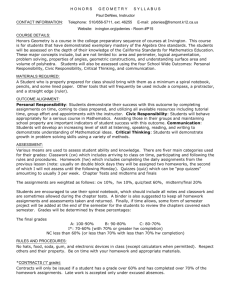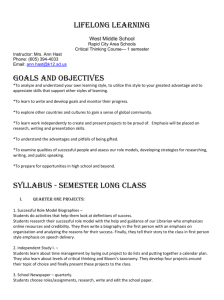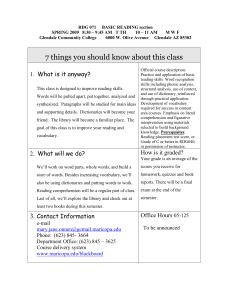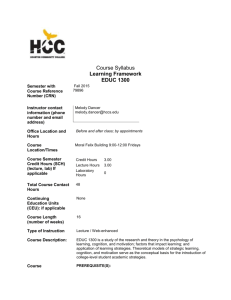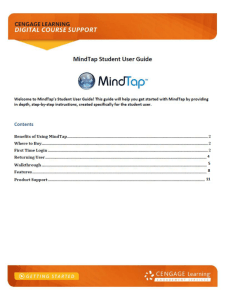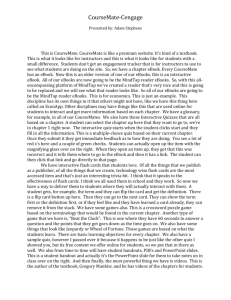EDUC 1300 Fall 2015 16 weeks Syllabus
advertisement
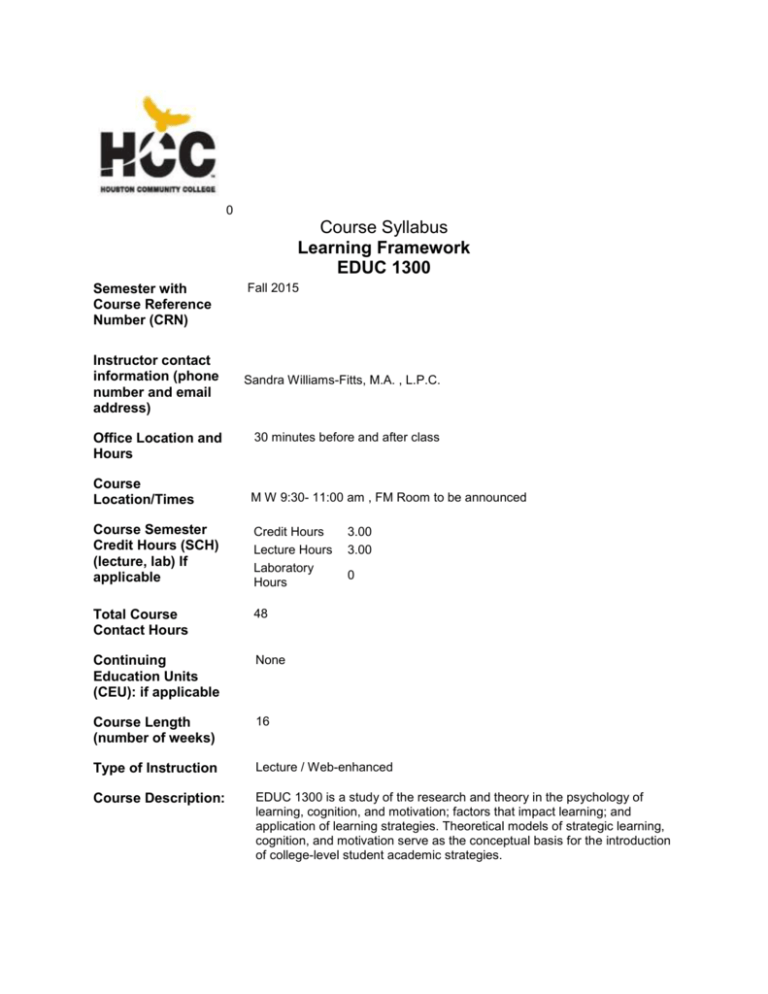
0 Course Syllabus Learning Framework EDUC 1300 Semester with Course Reference Number (CRN) Instructor contact information (phone number and email address) Office Location and Hours Fall 2015 Sandra Williams-Fitts, M.A. , L.P.C. 30 minutes before and after class Course Location/Times M W 9:30- 11:00 am , FM Room to be announced Course Semester Credit Hours (SCH) (lecture, lab) If applicable Credit Hours Lecture Hours Laboratory Hours Total Course Contact Hours 48 Continuing Education Units (CEU): if applicable None Course Length (number of weeks) 16 Type of Instruction Lecture / Web-enhanced Course Description: EDUC 1300 is a study of the research and theory in the psychology of learning, cognition, and motivation; factors that impact learning; and application of learning strategies. Theoretical models of strategic learning, cognition, and motivation serve as the conceptual basis for the introduction of college-level student academic strategies. 3.00 3.00 0 EDUC 1300 – page 2 Course Prerequisite(s) PREREQUISITE(S): Must have the reading skills to place into INRW 0410. Course Student Learning Outcomes (SLO): 4 to 7 1. Construct a personal learning system informed by the research and theory in the psychology of learning, cognition, and motivation. 2. Identify factors that impact learning and apply techniques and strategies to achieve personal, financial, academic, and career success. 3. Use technological tools and library resources to acquire information, solve problems and communicate effectively. 4. Develop an educational and career plan based on individual assessments and exploration of options. Learning Objectives (Numbering system should be linked to SLO - e.g., 1.1, 1.2, 1.3, etc.) (SLO #1) Construct a personal learning system informed by the research and theory in the psychology of learning, cognition, and motivation. 1.1 Identify their personal learning style as well as strengths and weaknesses as a strategic learner and apply their knowledge to classroom learning. 1.2 Describe basic theories in the psychology of learning, memory, cognition, and motivation. 1.3 Demonstrate the use of learning strategies and study skills. (SLO #2) Identify factors that impact learning and apply techniques and strategies to achieve personal, financial, academic, and career success. 2.1 Explore strategies for adapting to different learning environments and delivery formats. 2.2 Identify college resources and their benefits. 2.3 Expand financial capabilities by gaining and exercising financial knowledge. 2.4 Acquire techniques and skills for personal and professional success. (SLO #3) Use technological tools and library resources to acquire information, solve problems and communicate effectively. 3.1 Access online college resources and services.. 3.2 Complete a library orientation. 3.3 Use social networking and electronic communications appropriately. (SLO #4) Develop an educational and career plan based on individual assessments and exploration of options. 4.1 Identify and file the appropriate degree plan with proper advisement. 4.2 Write and prioritize short-term and long-term goals related to your time at Houston Community College. 4.3 Explore career options incorporating the use of related assessments and search tools. Texas Core Curriculum Competencies: Statement of Purpose: Students will gain a foundation of knowledge of human cultures and the physical and natural world, develop principles of personal and social responsibility for living in a diverse world, and advance intellectual and practical skills that are essential for all learning. A variety of academic experiences are used to develop these competencies. Core Objectives: Students will prepare for contemporary challenges by developing and demonstrating the following core objectives: EDUC 1300 – page 3 Critical Thinking Skills: These include creative thinking, innovation, inquiry, and analysis, evaluation and synthesis of information. Communication Skills: These include effective development, interpretation and expression of ideas through written, oral and visual communication. Empirical and Quantitative Skills: These include the manipulation and analysis of numerical data or observable facts resulting in informed conclusions. Teamwork: These include the ability to consider different points of view and to work effectively with others to support a shared purpose or goal. Personal Responsibility: These include the ability to connect choices, actions and consequences to ethical decision-making. Social Responsibility: These include intercultural competence, knowledge of civic responsibility, and the ability to engage effectively in regional, national, and global communities. Course Calendar See page seven for assignment deadlines and dates for exams. Instructional Methods Face to Face Web-enhanced (49% or less) A variety of instructional methods are used throughout the semester. Examples may include class discussions, lectures, readings, group projects, video/DVD, internet searches, and presentations. As an instructor, I want my students to be successful. I feel that it is my responsibility to provide you with knowledge and opportunities for critical thinking and applications as appropriate. As a student wanting to succeed at your academic and career endeavors, it is your responsibility to do the assigned readings, submit assignments on time, participate in discussion forums and other activities, attend class (face-to-face, and online portions), and enjoy this learning experience as you learn how to use tools for success. Student Assignments Assignments have been developed that will enhance your learning. You will be required to successfully complete these assignments. Please see page six for more information. Student Assessment(s) Knowledge checks are given in most of the online topics sections. In addition, a mid-term and final exam will be administered. Instructor's Requirements As your instructor, it is my responsibility to: Provide the grading scale and detailed grading formula explaining how student grades are to be derived. Facilitate an effective learning environment through class activities, discussions, and lectures or other forms of presenting materials. Provide the course outline and class calendar, which will include a description of any special projects or assignments. Arrange to meet with individual students before and after class as required. Inform students of policies, such as attendance, withdrawal, tardiness and make up. To be successful in this class, it is the student’s responsibility to: Attend class and participate in class discussions and activities. EDUC 1300 – page 4 Read and comprehend the textbook. Complete the required assignments and exams: Ask for help when there is a question or problem. Keep copies of all paperwork, including this syllabus, handouts, and all assignments. Complete the course with a passing score. Program/Discipline Requirements: If applicable You will be required to complete the Financial Literacy & Capabilities Survey, declare your major, populate your student planner with the appropriate courses, and meet with your assigned advisor during this course. HCC Grading Scale A = 100- 90 4 points per semester hour B = 89 - 80: 3 points per semester hour C = 79 - 70: 2 points per semester hour D = 69 - 60: 1 point per semester hour 59 and below = F 0 points per semester hour IP (In Progress) 0 points per semester hour W(Withdrawn) 0 points per semester hour I (Incomplete) 0 points per semester hour AUD (Audit) 0 points per semester hour IP (In Progress) is given only in certain developmental courses. The student must re-enroll to receive credit. COM (Completed) is given in non-credit and continuing education courses. To compute grade point average (GPA), divide the total grade points by the total number of semester hours attempted. The grades "IP," "COM" and "I" do not affect GPA. http://www.hccs.edu/district/students/student-handbook/ Instructor Grading Criteria Instructional Materials EGLS3 – Evaluation for Greater Learning Student Survey System HCC Policy Statement: Harrington, C. M. (2016). Student Success in College: Doing What Works! 2nd Edition. Boston: Cengage Learning At Houston Community College, professors believe that thoughtful student feedback is necessary to improve teaching and learning. During a designated time, you will be asked to answer a short online survey of research-based questions related to instruction. The anonymous results of the survey will be made available to your professors and division chairs for continual improvement of instruction. Look for the survey as part of the Houston Community College Student System online near the end of the term. EDUC 1300 – page 5 Access Student Services Policies on their Web site: http://www.hccs.edu/district/about-us/policies/d-student-services/ Attendance Policy: For a 3 credit-hour lecture class meeting 3 hours per week (48 hours of instruction), you can be dropped after 6 hours of absence. The 6 hours includes accumulated minutes for arriving late to class and leaving class early. Distance Education and/or Continuing Education Policies Access DE Policies on their Web site: All students are responsible for reading and understanding the DE Student Handbook, which contains policies, information about conduct, and other important information. For the DE Student Handbook click on the link below or go to the DE page on the HCC website. The Distance Education Student Handbook contains policies and procedures unique to the DE student. Students should have reviewed the handbook as part of the mandatory orientation. It is the student's responsibility to be familiar with the handbook's contents. The handbook contains valuable information, answers, and resources, such as DE contacts, policies and procedures (how to drop, attendance requirements, etc.), student services (ADA, financial aid, degree planning, etc.), course information, testing procedures, technical support, and academic calendars. Refer to the DE Student Handbook by visiting this link: http://de.hccs.edu/media/houston-community-college/distanceeducation/student-services/2013-2014HCCDEStudentHandbook%28Revised8-1-2013%29.pdf Advising Title IX A Sr. Advisor is connected to this class section and will meet with the class within the first two weeks of class. The Sr. Advisor will review the advising syllabus and the ways in which you can communicate with them. Students are required to meet with their advisor at least twice within the semester. Participation in these advising sessions is required and will be a part of the grade in this success class. HCC is committed to providing a learning and working environment that is free from discrimination on the basis of sex which includes all forms of sexual misconduct. Title IX of the Education Amendments of 1972 requires that when a complaint is filed, a prompt and thorough investigation is initiated. Complaints may be filed with the HCC Title IX Coordinator available at 713 718-8271 or email at oie@hccs.edu. EDUC 1300 Learning Framework Fall Calendar, 2015 WEEK TEXT CHAPTER 1 TOPICS Start Here: Course Introduction / Syllabus ASSIGNMENTS CFSI Your academic autobiography Your College Resources – It’s All About You! Textbook and Mindtap Resources (ex. 7 Smart Strategies Feature in Text) 2 1 – College Expectations: Becoming a Critical Thinker Academic Integrity ( pp. 116-120) Academic Expectations and Netiquette Critical Thinking and Information Literacy Chapter 1 Reading Assignment 3 1 – College Expectations: Becoming a Critical Thinker Advice vs. Research: Understanding the Value of Psychological Research Actively Reading Strategies: 3R and SQ3R Reading Peer Reviewed Research Mindtap Assignments (Time for Actions) Mindtap Online Chapter Quiz 4 Chapter 2: Skills You Need: Memory, NoteTaking, and Studying Learning and Memory Note-Taking Chapter 2 Reading Assignment Writing Assignment: Exploring the Research in Summary Worksheet p. 45 DUE DATES EDUC 1300 – page 7 5 6 7 8 Chapter 2: Skills Research Based Study Strategies You Need: Memory, NoteTaking, and Studying Chapter 3: Goal Setting: The ABC’S Approach Setting Goals and Making the Most of Your Time Chapter 3: Time Management Setting Goals and Making the Most of Your Time Chapter 4: It’s Show Time: Tests, Papers, and Presentations 9 10 Chapter 4: It’s Show Time: Tests, Papers, and Presentations 11 Chapter 5: Motivation, Resilience, Stress Test-Taking Skills Mindtap Assignments (Time for Actions and Critical Thinking) Mindtap Online Chapter Quiz Chapter 3 Reading Assignment Mindtap Assignments (Time for Actions and Critical Thinking) Writing Assignment: Multi-Tasking: Exploring the Research in Summary Worksheet ( re: article on p. 76) Mindtap Online Chapter Quiz Chapter 4 Reading Assignment MIDTERM EXAM Mid-Semester Reflection Papers and Presentations Visit Library Exam Chapters 1-4 Motivation, Resilience, and Stress Management Chapter 5 Reading Assignment Mindtap Assignments (Time for Actions) Finding Two Possible Articles for the Presentation Mindtap Assignments (Time for Actions) Mindtap Online Chapter Quiz EDUC 1300 – page 8 12 13 14 15 16 Management: Strategies for When College and Life Get Challenging Chapter 6: How Are You Doing? Maximizing Learning via SelfReflection Research Article Presentations Chapter 7: Making Good Academic, Career, and Financial Decisions Chapter 7: Making Good Academic, Career, and Financial Decisions Mind Tap online chapter quiz Self-Regulation and Reflection Chapter 6 Reading Assignment Mindtap Assignments (Time for Actions) Mindtap Online Chapter Quiz Presentations Decision Making Process Career Exploration and Decision Making Chapter 7 Reading Assignment Academic Decisions and Your Degree Plan Financial Decisions Mindtap Assignments (Time for Actions) Written Assignments: College Plan and Career Project Due Mindtap Online Chapter Quiz FINAL EXAM and End of Semester Reflection Exam: Chapter 1-7 EDUC 1300 – page 9 Assignment Information To accomplish all of the learning goals, you will need to be engaged in many learning activities outside of the classroom. Your final grade in this class will be based on three different types of assignments: 1. Chapter assignments (reading assignment, Mindtap assignments, and quizzes) 2. Written Assignments and Presentations 3. Exams Chapter Assignments (30%) Reading Assignments (10%) To help you prepare for class activities, you will need to read the chapters prior to class and answer several reading questions. Mindtap Assignments (10%): The assigned activities in Mindtap are designed to give you an opportunity to practice and apply skills learned. Quizzes (10%): One of the best ways to learn is by testing yourself (this is called the testing effect!) so the online quizzes in Mindtap are a great way to learn. Because quizzes are a learning tool, you will be able to take the quizzes as many times as needed and your highest score will count. Written Assignments and Presentations (45%) Writing Assignments (30%)Throughout the semester, you will be asked to complete several writing assignments ranging from reflection papers to research summaries. The purpose of these assignments is to enhance your writing and thinking skills while also learning course content. Presentation (15%) To help you develop your oral expression skills along with your ability to work effectively with others, you’ll have an opportunity to do a group presentation. This presentation will be on an original research study so the assignment also allows you to more deeply explore a student success area. Exams (25%) Midterm (10%) and Final Exam (15%) Exams are an opportunity for you to apply study skills and show what you’ve learned. It’s a time to celebrate your accomplishments. Exams will consist of multiple choice and short answer questions. EDUC 1300 – page 10 Reading Assignments: Chapter 1 Reading Assignment pp. 1-42 1. What are the positive outcomes associated with earning a college degree? 2. Define academic integrity and strategies to avoid unintentional dishonesty. 3. Describe Bloom’s taxonomy and discuss how critical thinking skills are developed. 4. What is a peer-reviewed journal article? What information can you find in the different sections of a research article? Why is it valuable to learn how to read scholarly sources? Chapter 2 Reading Assignment pp. 43-74 1. What is the testing effect? Describe the key findings of the Einstein, Mullet & Harrison (2012) study and the value of the findings. 2. Describe how memory works and how students can use knowledge about memory to improve academic performance. 3. Why is studying in groups advantageous? What does the research say about this learning approach? Chapter 3 Reading Assignment pp. 75-110 1. Describe the research study on multi-tasking that was conducted by Sana, Weston & Cepeda (2013). What is the value of this research? 2. Discuss the research on goal setting. How do goals contribute to success? 3. How does time management connect to success? Describe the research on this topic. Chapter 4 Reading Assignment pp. 111-148 1. What factors should you consider when evaluating a source? How can you determine if it is a credible source? 2. Describe Mayer’s Multi-Media principles. How can these principles increase success when presenting? 3. Based on the research, what do the best performing students do when preparing for and taking tests? 4. What strategies can help groups function more productively? Chapter 5 Reading Assignment pp. 149-184 1. Compare and contrast behavioral, cognitive, humanistic, and social motivational theories. Provide examples of how these theories can impact success in college and careers. 2. Based on the research, what are the most important resilient factors? How can these skills be developed? 3. How do successful individuals manage stress? EDUC 1300 – page 11 Chapter 6 Reading Assignment pp. 185-222 1. Describe the academic self-regulation process and how engaging in this process can increase successful outcomes. 2. According to the research, how accurate are our self-assessments? Why is this important to know? Based on these findings, what actions might be needed? 3. How does attribution theory and locus of control play a role in success? 4. What self-reflective techniques will increase the likelihood of success? Chapter 7 Reading Assignment pp. 223-264 1. What was the key finding from the Coulter-Kern, Coulter-Kern, Schenkel, Walker, & Fogle (2013) study? How can you use these findings to increase your career success? 2. Describe the decision making process. What are some ethical considerations related to decision making? 3. Compare and contrast Holland and Krumboltz’s career theories. Describe the career exploration process. EDUC 1300 – page 12 Written Assignments: 5 points each CSFI- College Success Factors Index Complete this online assessment. Write a 1-2 page summary of your results and how this information can help you succeed. Your Academic Autobiography Write a 3 page paper discussing your academic life thus far. What were your favorite parts of school? What challenges did you encounter? Describe your college experiences thus far. Exploring the Research in Summary Worksheet After reading the article on p. 45, complete a research summary. A blank summary form can be found on p. 264 Multi-Tasking: Exploring the Research in Summary Worksheet After reading the article on p. 76, complete a research summary. A blank summary form can be found on p. 264 College Plan Document your visit with your academic advisor. Write a brief summary of this meeting. Complete an educational plan so you have a clear vision of what is needed in order to graduate. Career Project (include CRAAP test evaluations for websites used) After reading and completing the activities in the self-assessment section (p. 242- 250), write a comprehensive career profile for yourself. Include your values, abilities, interests, and personality factors. How can this information guide you in the career decision making process? Presentation Using websites and informational interviews, investigate at least 2 different careers. Be sure to include information on the job tasks, qualifications, job outlook, salary, and related fields. Create a Power Point presentation (using multi-media tips from Chapter 4) to inform the class about the careers you investigated. EDUC 1300 – page 13



